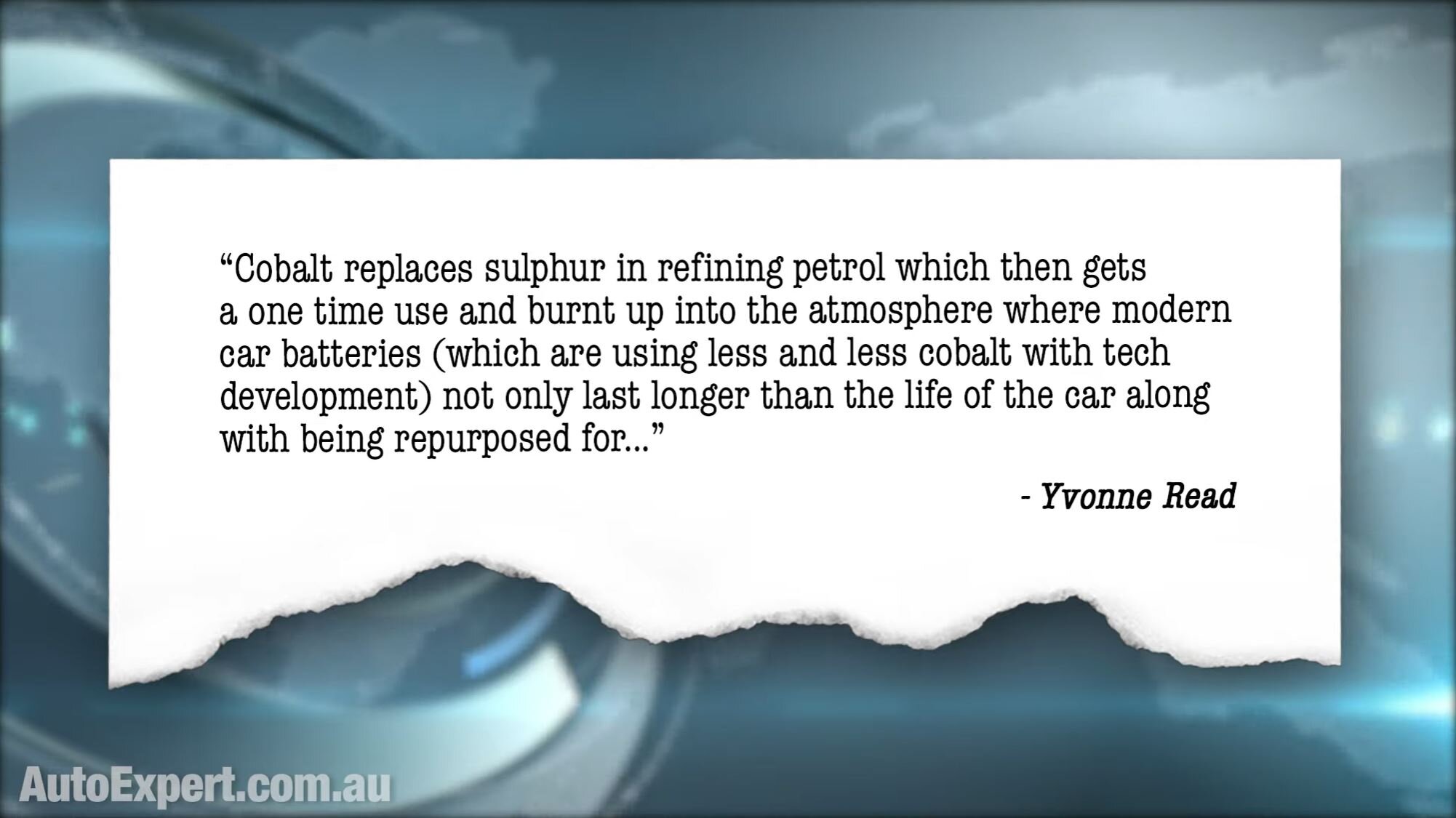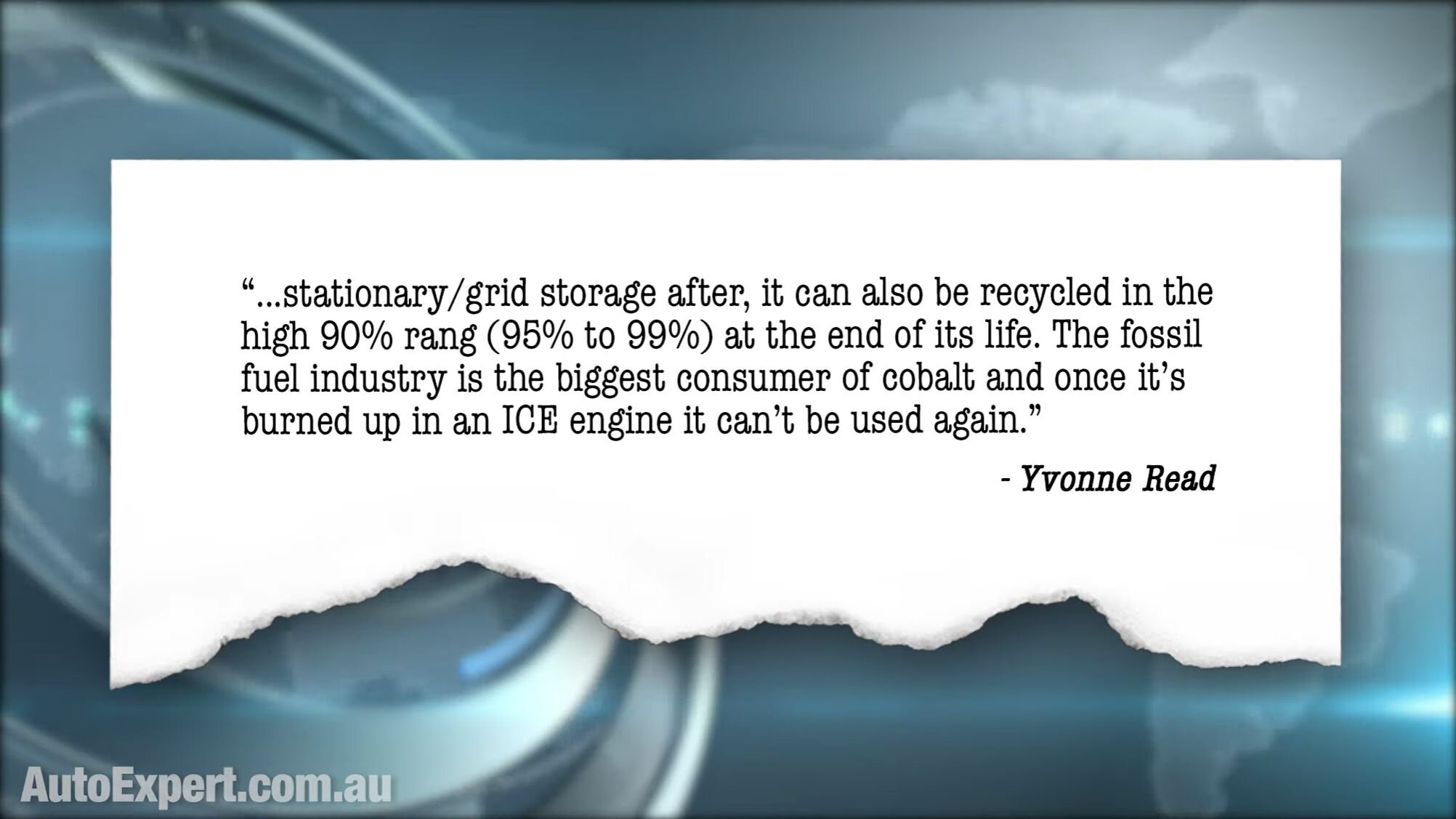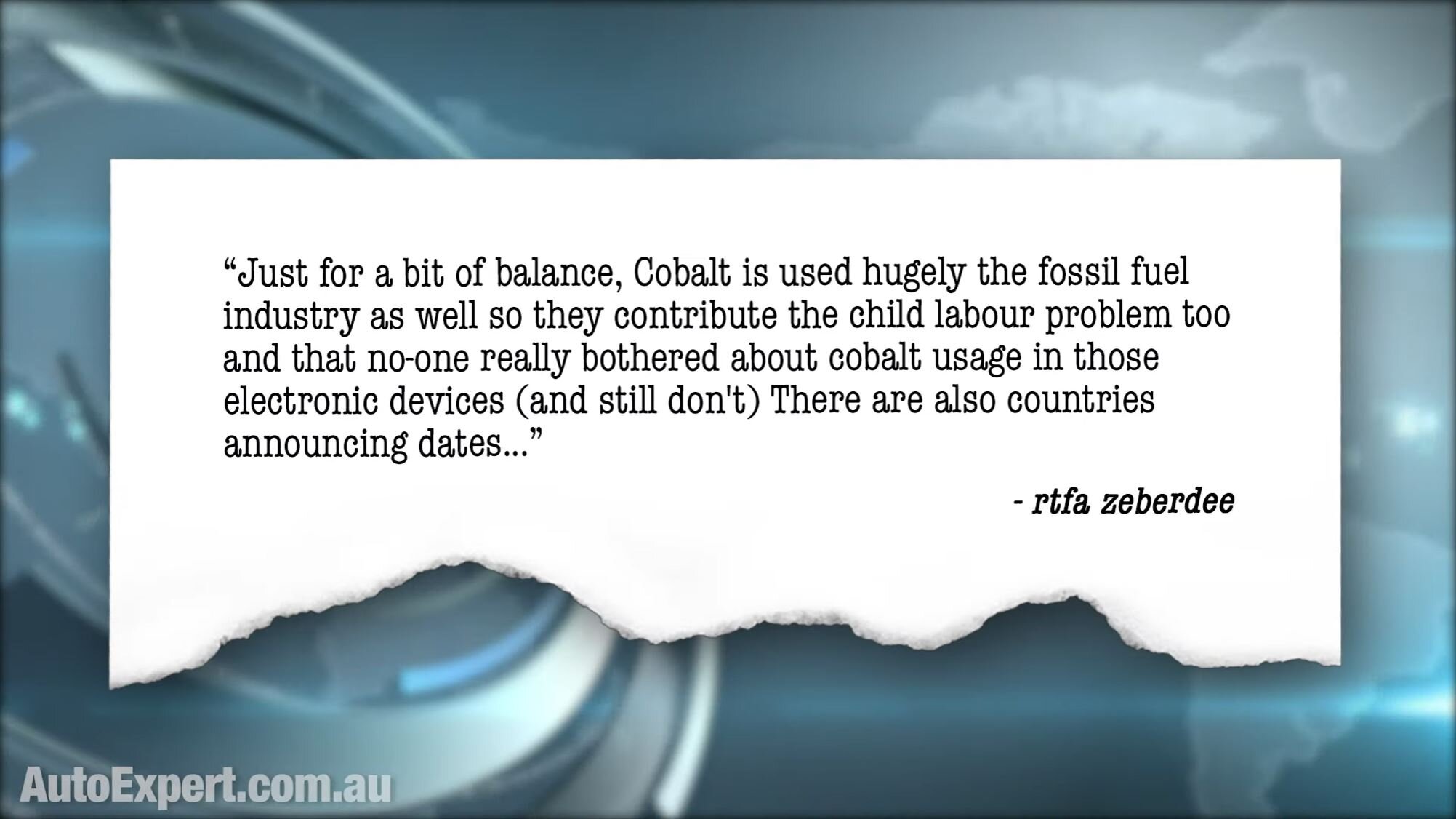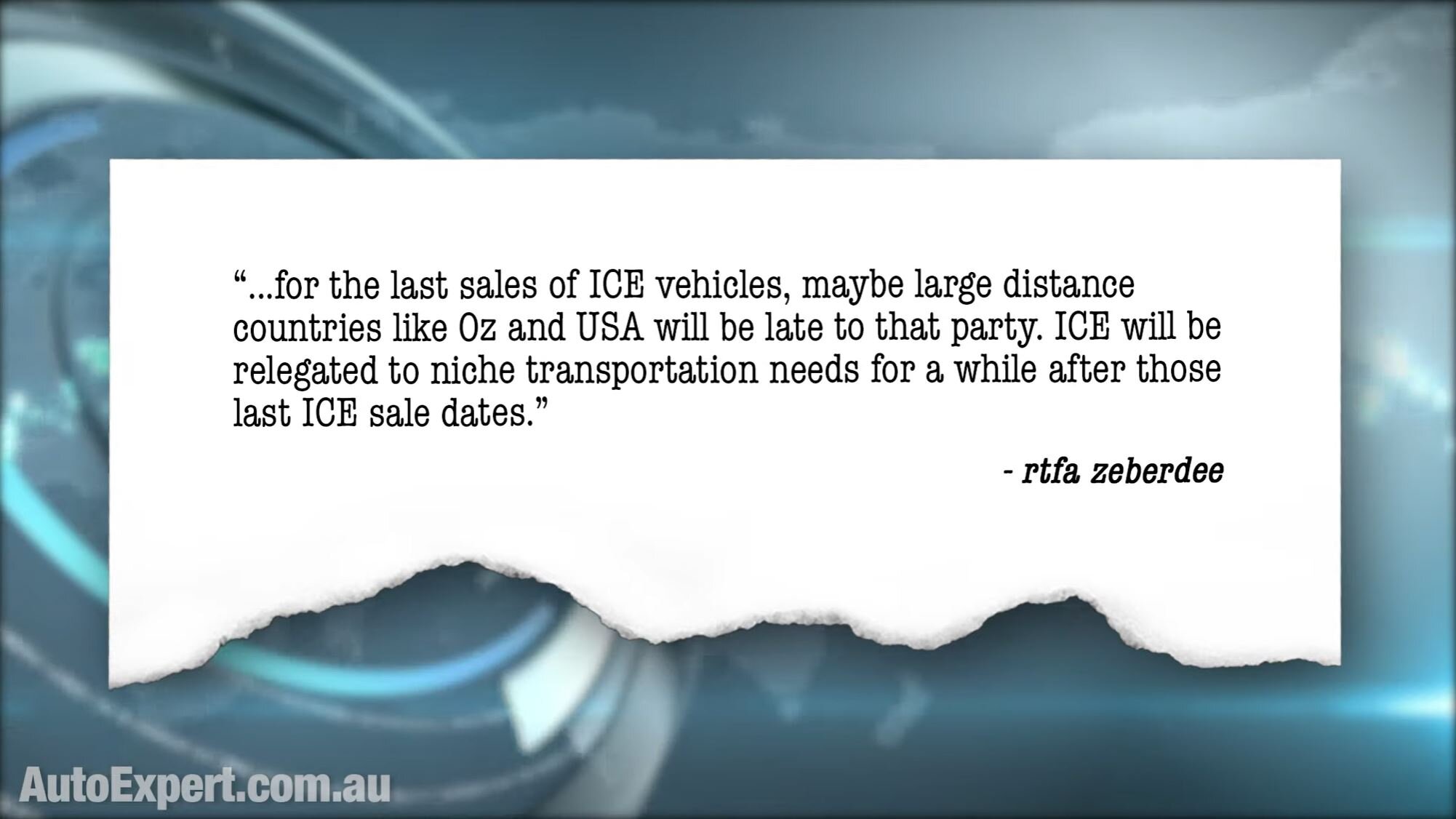Cobalt Blues: Mythbusting your comments about cobalt in EV batteries and fuel
Cobalt catalyst moron misrepresentation meltdown. EV zealots get the basics wrong in the comments.
Warning: This report may contain traces of nuts.
Recently I reported on what I’d learned after driving 9000 kilometres in the Kona Electric EV. 12 things I’d learned, specifically.
One of those 12 was about cobalt - which is currently an essential ingredient in lithium-ion batteries used in EVs (and nearly all portable electronic devices - such as phones, cameras, tablets and laptops).
Cobalt is also a significant human rights issue - involving fairly grubby child labour exploitation in places like the DRC. You’re not supposed to like this, but it’s a thing, and it’s likely to get worse as demand for cobalt accelerates thanks to the proliferation of EVs.
You’ve seen governments and carmakers championing the virtues of EVs. They’re generally pretty silent - deafeningly silent - on the how they will ensure the cobalt they will rely on to electrify transportation doesn’t involve human rights abuses.
Of course, this fact does not suit the world of the EV nutbag, and I got hundreds of authoritative-sounding nutbag fringe comments as a result. Like this one, from Roy King:
Roy, dude: Cobalt is used in refineries as a catalyst for the desulphurisation of fuel. Catalysts help reactions occur but they don't take part. (They lower the activation energy, but apart from that they’re just chemical voyeurs.)
Therefore, cobalt is not actually 'in' any fuel you buy. Therefore, it does not spew from the exhaust. Nor does it enter the environment. So there’s that.
And the catalysts in refineries are in fact quite recyclable. Refiners have been recycling spent catalysts into fresh catalysts and specialist materials for many years now - as this report from the journal ‘Digital Refining’ (from 2013) clearly shows. But apart from that, Roy: Well done there, respecting the facts.
USEFUL LINKS FOR METALLURGY & MANUFACTURING
I was wrong (about recycled aluminium) >>
New car supply got smashed by a global computer chip supply shortage >>
The mad metallurgy of advanced high strength steel >>
Rustproofing rip-off: the truth about rust in modern cars >>
My AutoExpert AFFORDABLE ROADSIDE ASSISTANCE PACKAGE
If you’re sick of paying through the neck for roadside assistance I’ve teamed up with 24/7 to offer AutoExpert readers nationwide roadside assistance from just $69 annually, plus there’s NO JOINING FEE
Full details here >>
Cobalt Report
More of this kind of misinformed bullshit was common in the comments too - entertainingly:
Okay, recycling: We’ve addressed that already. As to ‘biggest user’ I suppose the options are: A) take the word of a fake-named dipshit in the YouTube comments feed, or B) use a source like Global Energy Metals Corp (and numerous other leading industry references which corroborate these data).
As you can see here: the lithium-ion battery was the biggest global application for cobalt. By a substantial margin. For at least four years now. Sixty-two per cent of the 2020 market for cobalt went into batteries. Followed by: Superalloys, hard metals, ceramics and pigments.
Catalyst use is in the ‘others’ category. It’s roughly half of ‘other’. Refineries represent the biggest application for cobalt in the catalysts sector. But it’s a fraction of the amount which goes into batteries.
According to GEMC, global demand for cobalt is up 30 per cent from 2016 to 2020, with battery demands for cobalt rising 58 per cent in that time. It’s batteries accelerating the demand for cobalt, and because cars require big batteries - this is largely a result of increasing EV production.
Yvonne Read now, with an equally interesting misrepresentation of reality:
Vonny, Vonny, Vonny. Cobalt doesn’t replace sulphur in fuel, honey-bunny. It’s a catalyst used to remove sulphur. So it’s not a one-time thing at all. They’re very different things. I’m sure teenagers in high school learn about catalysts - I know I did. Perhaps you were absent that day.
So, cobalt: it’s not in the fuel. Not burned up into the atmosphere. It’s not used once. It is recycled. The fossil fuel industry: not the biggest user of cobalt. Apart from that - we agree - almost.
On batteries moving away from cobalt: There are batteries that use less cobalt, but commercially deployed cobalt-free batteries are currently pie in the sky. Panasonic says it’s aiming for cobalt-free for Tesla, but offers no details on how. And all cobalt-free potential technologies are compromised. They’re not yet deployable for production in cars, and they may never be.
Battery chemistry is already a balancing act with three decades of diligent research already done and dusted. There are strong incentives to reduce cobalt - and they’re not based on cleaning up human rights abuses. Cobalt is expensive, and production in line with increased demand is unsustainable.
Gains here will be slow and incremental. COBRA is a cobalt-free battery research project funded by the European Commission. It’s running until 2024 - and it’s a long road from research to commercialisation.
So: You reduce cobalt in batteries, but energy density takes a hit - batteries get heavier for the same storage capacity, which is exactly what you do not want in a car, and they might not last as long either, or need to be recharged more slowly. These are the kinds of engineering trade-offs on the table for reducing cobalt.
Apart from that - valuable contribution, Yvonne. Well done, although if I might make just one somewhat presumptuous constructive suggestion, it might be an overall improvement to respect the facts more when commenting in future.
Mr Adonis 252 now, proving (in my view) why advanced aliens from other galaxies don’t make contact (at least, not officially):
I think we can agree that child exploitation in mining cobalt is wrong - but that’s about all we agree on here.
In this 2016 report by JRC Science for Policy, for the European Commission, catalysts represented five per cent of global demand for cobalt. (That’s all catalysts - not just the petrochemical industry.) The battery sector used 10 times more cobalt than that. Last year, it was more like 12 times. Battery use of cobalt has grown roughly 21 per cent since then. And it’s going to keep growing. Obviously.
Okay, striving for a point of consensus here, with Patrick: “Nasty fume deaths.” Yeah, definitely bad. But I am not not criticising EVs, or carmakers (or electronic device companies broadly) for using cobalt. I’m not criticising the fuel industry for using cobalt, either.
I’m criticising industry and governments for not taking a more definite stance on human rights abuses in the cobalt production process, which could easily get worse as demand increases for EVs and therefore batteries.
I’m criticising - in particular - arsehole organisations that want to appear squeaky clean by dealing with cutouts. Meaning companies that appear squeaky clean because they don’t exploit children themselves, directly, but they’re happy to source unethical cobalt and use it to make components for bigger companies. This is like money laundering, only the currency is human suffering.
And finally:
Cobalt use in the fossil fuel industry is currently less than one tenth of the volume used in battery production, and that proportion is set to fall as battery production continues to accelerate. So there’s that.
Sales of the Century
Countries phasing out the sale of new internal combustion vehicles: Last time I looked, there were 195 countries on Earth. At present, 14 of them have plans in place to eliminate the sale of new internal combustion cars by 2030. Eight more have plans to do this after that, including Costa Rica by 2050. China has such plans - allegedly - but no proposed date for this.
So that’s 14 plus eight, plus China’s firm possibility of a definite zero ICE, ICE Maybe’ at some indeterminate point in the future … equals 23 countries with alleged ‘plans’ (most of which are simply political thought bubbles rather than locked-in legislative frameworks).
Therefore, 172 countries have no such plans. That’s 88 per cent of the countries on earth, by the way. And the countries that have committed this - well, ‘committed’ is the wrong word. They’ve hooked up on Tinder, once, and they were drunk. High on green virtue, but not that rational on planning. It’s hardly like they’re married to the idea.
USEFUL LINKS FOR BUYING AN EV
Hyundai Kona Electric: What's living with a battery-powered SUV really like? >>
The terrible and unexpected cost of Nissan Leaf ownership >>
Kona EV and fat Michelin tyres: A sub-$1000 bang-for-buck dynamics hack >>
How green is EV ownership? A reality check >>
Hyundai Ioniq EV: Top 10 things to know when test driving an EV >>
One serious aspect I wanted to mention here is that if you are a reasonable, rational person, you should be as concerned as I am at what these comments demonstrate, more broadly.
There is a willingness among some people to argue a position that is more or less completely divorced from the facts - just because the facts are at odds with the way they want the world to be.
We should all be able to say that human rights abuses against children mining cobalt in the DRC is bad. If you don’t think this, there is something wrong with you. I’m tipping the only people who thing this is good are the arseholes exploiting the children in shithole cobalt mines.
If the governments and multinationals driving the demand for cobalt took a strong stand on this, this is a frown they could turn upside-down relatively easily.
And yet, some people perceive my comments on this as an attack by ‘tailpipe Satan’ against nothing less than the hallowed virtue of the clean, green electric future.
The real world has nuance. EVs will clear the somewhat toxic air in our cities. This will involve the exploitation of children in places like the DRC. A reasonable person would like the clean air and hate the exploitation, and call for action on the latter.
But of course the EV nutbag evangelist does not have to operate in a fact-based landscape. Hence the majority of cobalt goes into the fuel and up into the air, and can’t be recycled - didn’t you know? Because batteries are virtuous and no other position can be entertained.
I’d suggest that inventing facts in an ad hoc manner such as this, is not the way to solve humanity’s problems. Respecting them and dealing with them is probably better - especially the inconvenient ones.
But everyone gets a voice now, right? And the internet allows you to weaponise your confirmation bias, which, I suppose, for the weak-willed, is far more attractive than dealing with actual reality, which is, often enough, such a bitch.















